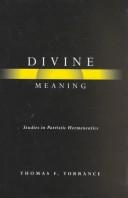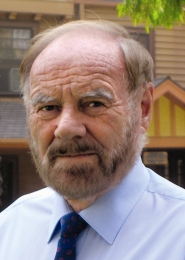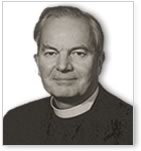 I have now been in Aberdeen for a week and am trying to hit the ground running. My doctoral dissertation topic is (for now) T. F. Torrance's doctrine of scripture. This is not normally considered a major theme in Torrance's work, but I think his perspective on the topic, when he does occasionally tackle it, is quite helpful.
I have now been in Aberdeen for a week and am trying to hit the ground running. My doctoral dissertation topic is (for now) T. F. Torrance's doctrine of scripture. This is not normally considered a major theme in Torrance's work, but I think his perspective on the topic, when he does occasionally tackle it, is quite helpful.To get started, I'll be going through Torrance's book, Divine Meaning, which is a collection of essays on patristic hermeneutics originally published primarily in the 70's and 80's in various journals. The introduction is one of the few places I have found so far where Torrance addresses himself directly to the doctrine of scripture. There, he makes the following claims about scripture:
1. Because scripture presents itself to us as the written form of God's Word, and it is thus God who is in control of it, no formal theoretical argument can be made to prove that it is God's Word. Torrance says,
At no point can we bring God under the compulsion of our theoretical demonstrations or constrain him to yield answers to us in accordance with our empirical stipulations. Our inquiry will necessarily take a self-critical form in which we seek to allow the Word of God to be its own evidence in declaring itself to us, and to call all our presuppositions into question before it, so that we may listen to it and seek to understand it without imposing ourselves upon it. Because it is the Word of God that we encounter, we approach it in humility before its divine majesty, and with receptiveness before its divine Grace, thus yielding to it as is proper precedence and ascendancy over us in all our knowing and interpretation.For Torrance, God's speaking in scripture, as is the case in all of His other acts, cannot itself be proved because whatever criteria one might set up to test it would necessarily be exercising a greater authority. Since there can be no greater authority than God, God himself must validate his own acts and they must be used as the criteria we employ to judge our acts; God's acts must be our starting point, not a conclusion we derive from other, prior data.
Is Torrance merely echoing Barth here, or is he saying something new?
2. The Bible is at the same time a human book and God's book. The Bible is a book written by men, yet in their words we hear God's Word. This union of human word and divine Word is thus analogous to the hypostatic union of human person and divine Person in Jesus Christ, though not strictly alike. Torrance sees the human word and divine Word as being united in the Bible only "through dependence upon and participation in Christ, that is, sacramentally," (p. 7). Dualism, Torrance's arch enemy, is thus overcome totally and solely through Christ's incarnation, the Word becoming flesh, and its overcoming is evident in the ability of a human book, the Bible, to bear God's Word to us. Penetrating deeper, Torrance says, "for Christians, the real text with which we have to do in the New Testament Scriptures is the humanity of Jesus Christ, for it is in the humanity of the Word of God incarnate in him, that we meet and are addressed by the Word of the living God" (p. 7).
3. Torrance next makes an interesting move. He begins with Christ's assumption of our fallen humanity in order to redeem it and applies this principle to scripture. First, a word about fallen humanity. Torrance is an outspoken advocate of this position because, operating under the patristic maxim that what is unassumed by Christ is unhealed, he perceives that if Christ had taken on only a pre-fallen Adamic humanity, then he would only be united with that humanity, which none of us possess. Since Christ has come to save us, he must take on the full reality of humanity, including its fallen nature, even its final consequence of death and alienation from God, and bend it back into conformity and unity with God by living a perfect life of obedience, love and sacrifice to the Father. By taking on our humanity, Christ simultaneously judges it as sinful and redeems it by living a sinless life.
Now Torrance draws on the analogy of scripture's dependence and participation in the person of Christ previously established to speak of scripture in the same way:
...so we must think of the Word of God in the Scriptures not only as accommodating himself to us in our weakness and littleness but as condescending to enter into our alienated and contradictory ways of thought and speech in order to reach us with his message and to restore us to converse with God in truth. Thus the Word of God comes to us in the Bible not nakedly and directly with clear compelling self-demonstration of the kind that we can read it off easily without the pain and struggle of self-renunciation and decision,but it comes to us in the limitation and imperfection, the ambiguities and contradictions of our fallen ways of thought and speech, seeking us in the questionable forms of our humanity where we have to let ourselves be questioned down to the roots of our being in order to hear it as God's Word. It is not a Word that we can hear by our clear-sightedness or mastery by our reason, but one that we can hear only through judgment of the very humanity in which it is clothed and to which it is addressed and therefore only through crucifixion and repentance (p. 8).This seems to me to imply an accusation of docetism to the doctrine of biblical inerrancy. Does inerrancy make the divine nature of scripture squash the human? Torrance's view of scripture does seem to help make sense of the constant arguments that go on over biblical interpretation even amongst the most conservative inerrantists - perhaps such difficulties should point us to the full reality of the Bible's dual nature, rather than challenge its divine origin.
4. Finally, Torrance applies to scripture the idea that in all of God's activities with humanity, revelation and reconciliation always accompany each other. Just as we cannot personally know Christ without being conformed to his likeness, so we cannot properly hear and understand God's voice in scripture without yielding to it and obeying it. Torrance here makes the unpopular (amongst some biblical scholars) claim that use of the proper exegetical methods does not guarantee proper understanding of scripture, though on the other side of this he does insist that because the Bible is a human book no less than a divine book, scientific hermeneutics must be learned and rigorously employed. He concludes with a discussion about the relationship between general hermeneutics and biblical hermeneutics, arguing that they must not be separated, that attending to God's Word in scripture will teach us how to interpret each other more faithfully.
Any thoughts?







